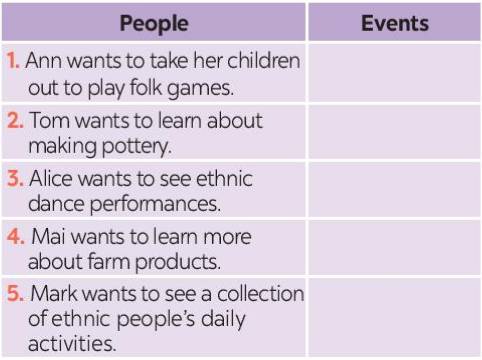* Read the following passage and mark the letter A, B, C, or D on your answer sheet to indicate the correct answer to each of the questions from 24 to 30. In Viet Nam festivals often take place during the three months in spring and in autumn when people have a lot of leisure time. In addition, the climate in spring and autumn is especially suitable for holding festivals and for festivals goers to enjoy. Traditional festivals constitute a form of cultural activities, a spiritual product which...
Đọc tiếp
* Read the following passage and mark the letter A, B, C, or D on your answer sheet to indicate the correct answer to each of the questions from 24 to 30.
In Viet Nam festivals often take place during the three months in spring and in autumn when people have a lot of leisure time. In addition, the climate in spring and autumn is especially suitable for holding festivals and for festivals goers to enjoy. Traditional festivals constitute a form of cultural activities, a spiritual product which the people have created and developed during the course of history. From generation to generation, the Vietnamese people preserve the fine tradition of “remembering the source while drinking water.” Festivals are events which represent this tradition of the community as well as honour the holy figures named as “gods” -the real persons in national history or legendary persons. The images of gods converge the noble characteristics of mankind. They are national heroes who fought against foreign invaders, reclaimed new lands, treated people, fought against natural calamities, or those legendary characters who affect the earthly life.
Accordingly, first and foremost, festivals are events when people pay tribute to divinities that rendered merits to the community and the nation. These are occasions when people come back to either their natural or national roots, which form a sacred part in their mind. Furthermore, testivals represent the strength of the commune or village, the local region or even the whole nation. Worshipping the same god, the people unite in solidarity to overcome difficulties, striving for a happy and wealthy life.
Moreover, festivals display the demand for creativity and enjoyment of spiritual and material cultural values of all social strata. They become a form of education under which fine traditional moral values can be handed from one generation to the next in a unique way of combining spiritual characters with competition and entertainment games. Festivals are also the time people can express their sadness and worries in a wish that gods might bestow favour on them to help them strive for a better life.
(Adapted from: Overview of Traditional Festivals - Viet Mam, Country and Peoples)
What is the best title of the passage?
A. Social, educational and historical values of Vietnamese festivals
B. When, how and why festivals in Vietnam keep their traditions
C. Time, formation and meaning of traditional Vietnamese festivals
D. Similarities, differences and changes in Vietnamese festivals


1. Childhood Fun
2. A Pottery Village
3. Performances
4. Ethnic Markets
5. Photo Exhibition
1. Childhood Fun
Ann wants to take her children out to play folk games.
(Ann muốn đem lũ trẻ ra ngoài chơi trò chơi dân gian.)
Thông tin: Children can have fun taking part in traditional folk games and make handicrafts with the help of local artisans.
(Trẻ con có thể vui chơi bằng cách tham gia vào các trò chơi dân gian và làm các đồ thủ công với sự giúp đỡ của các nghệ nhân địa phương.)
2. A Pottery Village
Tom wants to learn about making pottery.
(Tom muốn học làm gốm.)
Thông tin: An introduction to pottery making by artisans from Bau Truc pottery village.
(Giới thiệu về nghề làm gốm bởi các nghệ nhân ở làng gốm Bàu Trúc.)
3. Performances
Alice wants to see ethnic dance performances.
(Alice muốn xem những màn biểu diễn vũ điệu dân tộc.)
Thông tin: More than 20 performances demonstrating various traditional songs and dances.
(Có hơn 20 màn trình diễn biểu diễn rất nhiều bài hát và điệu múa truyền thống.)
4. Ethnic Markets
Mai wants to learn more about farm products.
(Mai muốn tìm hiểu thêm về các sản phẩm từ nông trại.)
Thông tin: Exhibition of specialities of many ethnic groups featuring vegetables, flowers, crafts, and more.
(Trưng bày nhiều đặc sản của các dân tộc bao gồm rau củ, hoa, đồ thủ công và rất nhiều thứ khác.)
5. Photo Exhibition
Mark wants to see a collection of ethnic people’s daily activities.
(Mark muốn xem bộ sưu tập về hoạt động hằng ngày của những người dân tộc.)
Thông tin: Photos showing the daily activities of ethnic people in their villages.
(Những bức ảnh cho thấy những hoạt động hằng ngày của các dân tộc trong làng của họ.)